| Community Engagement | Engagement of Tenants and Business Partners |
|||
| Staff Engagement |

Sustainability in housing cannot be achieved without the engagement and support of our stakeholders, which include:
- residents in our estates;
- business partners, including contractors and sub-contractors;
- our staff;
- other government colleagues;
- district councils;
- suppliers;
- green groups;
- the many organisations that represent society in general – both in the social as well as the environmental sphere;
- educational and professional institutions; and
- the media.
To ensure sustainability, it is important to hear views from our stakeholders and the community and create a sense of neighbourhood within our estates. To this end, the Housing Authority (HA) not only disseminated our sustainability initiatives and achievements to the community and our staff members through various means, but also launched various comprehensive engagement programmes including consultations, workshops, exhibitions, and games and competitions, to encourage active participation from stakeholders in our decision making processes.
| Stakeholder Engagement Targets for period 2007/08 | Progress |
| Conduct various initiatives for HA staff, active communications with staff and obtain feedback to enhance operational effectiveness. | Fully Met |
| Continue to actively work with relevant stakeholders to promote better understanding of Housing Authority policies and initiatives through different publicity channels. | Fully Met |
| Collaborate with green groups to conduct environmental awareness programme in PRH. | Fully Met |
| Promote green management initiatives in PRH estates by organizing Green Property Management Award with green groups. | Fully Met |
| Promote environmental awareness in Home Ownership Scheme estates by liaising with Property Management Agents (PMAs) to organise activities for residents in HOS courts and by referring environmental messages from the Environmental Protection Department to PMAs. | Fully Met |
Effective Communication with the Public
Information on housing policy and our activities can be accessed on the HA's web site, which has about 20 000 pages in English and Chinese. Following the trend in on-line communication we have introduced e-initiatives, including the use of electronic forms, online enquiry services and an Electronic Photo Library with thousands of Public Rental Housing (PRH) photographs, to enhance public accessibility of housing information and services; as a result we have had an average of almost 4 million hits a month.
Our e-initiatives also apply to the sale of our Surplus Home Ownership Scheme (HOS) Flats. In addition to the availability of floor plans, location maps and price lists on our web site, an online photo library showing interior shots of returned HOS flats was launched starting from the Phase 2 sale exercise. Since then, almost 15 000 photos of over 2 000 Phase 2 flats and over 4 000 photos of 655 returned Phase 3 flats were uploaded to the library. Over 963 500 hits were recorded during the two-week application period for Phase 2 sales.
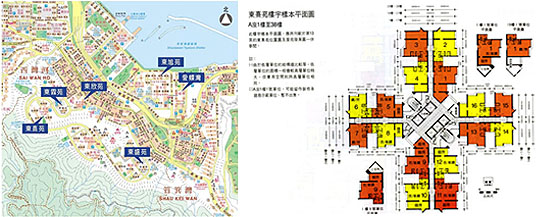
Location Map and Floor Plan of Tung Hei Court in Our Website![]()
First launched in 2004, our Housing Channel provides the latest housing information to tenants. During the year, we produced over 40 videos regarding the promotion of harmonious homes, public hygiene, green practices, and the sale of Surplus HOS Flats. We also make use of the Channel to dispatch special information for individual estates. The Housing Channel programmes are also available on our web site.
Our activities and initiatives are also highlighted and published in our online newsletter "Housing Dimensions" every two weeks. It serves as a quick update on the HA's latest initiatives for staff and the public. In 2007/08, we produced 25 issues covering our important environmental, social and financial initiatives.
We also produced the semi-annual "Estate Management Advisory Committee" newsletter to update PRH tenants on housing issues and estate news. To enhance accessibility and facilitate reading for the visually impaired, major stories in the newsletter were also available on the HA Hotline.
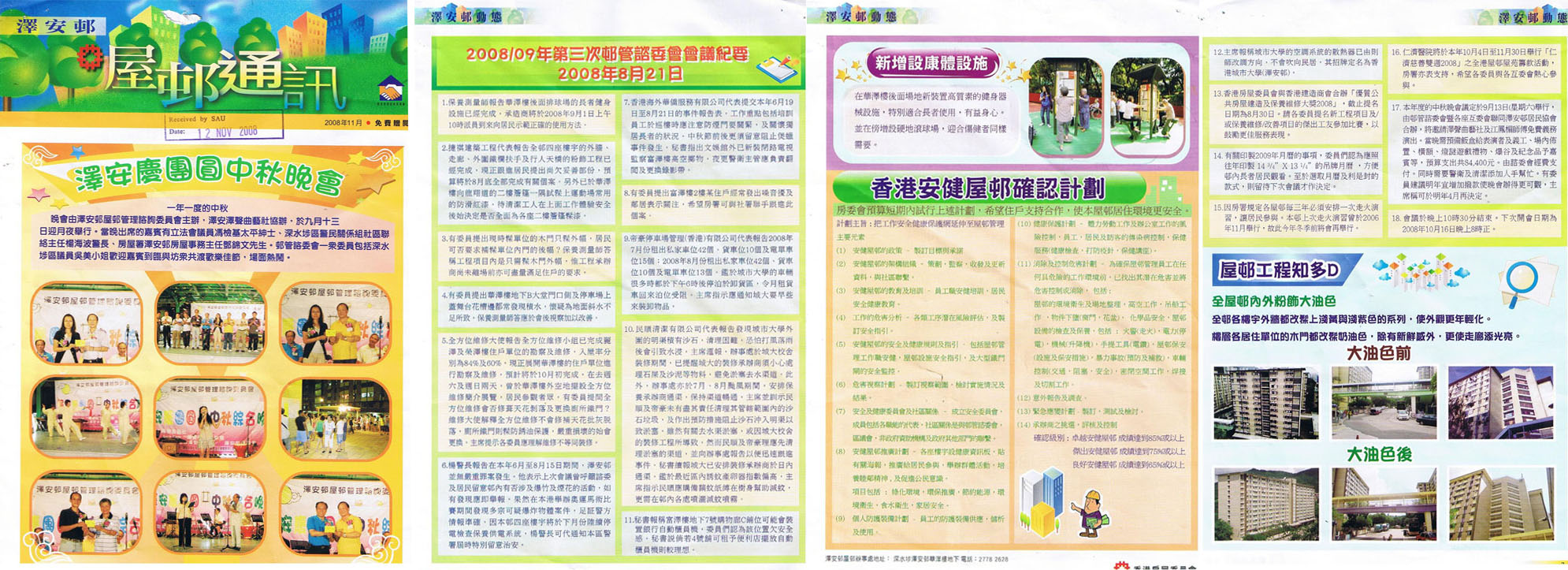
Estate Management Advisory Committee Newsletter![]()
Public Enquiries
The Housing Authority Hotline provides a direct communication platform between the HA and the public. In 2007/08, our hotline handled a total of 1 538 000 telephone calls, equivalent to almost 4 200 calls per day, an increase of more than 45.6% from the previous year. In addition, the Housing Department Integrated Communication Centre (HDICC) handled 74 700 e-mail and fax enquiries, an average of 200 cases per day.
To enhance our enquiry handling service, the HDICC will integrate with the Complaint and Requests Management System. The new system will enhance online registration, referrals, as well as the handling and monitoring of complaints and enquiries.
Community Involvement in Housing Development and Preservation
Under the "Let's Give Yau Tong a New Look" initiative, a series of workshops were held at the end of 2007 to discuss the design of the public open spaces at Yau Tong Estate, which will benefit 80 000 people when complete. More than 250 people participated in these workshops, contributing ideas, offering design options, establishing priorities and agreeing on the preferred layout for the open spaces.
In the past six years, following the redevelopment of the Lower Ngau Tau Kok Estate and the relocation of residents to the Upper Ngau Tau Kok Estate, we organised various activities involving local residents to preserve the cultural heritage of the area and to establish a sense of identity, ownership and kinship within the local community. Continuing our efforts, a series of workshops were held in 2007 to involve stakeholders in the design of the Ngau Tau Kok Estate.
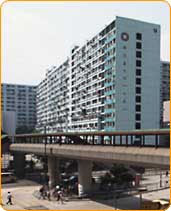 |
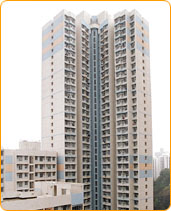 |
| Lower Ngau Tau Kok Estate | Upper Ngau Tau Kok Estate |
Built in the 1950s, Mei Ho House at Shek Kip Mei is one of Hong Kong's oldest resettlement blocks. It is part of Hong Kong's public housing history and was classified as a Grade I historical building by the Antiquities Advisory Board in 2005. To gain public views on how the building will be revitalised and of use to the community, a competition was held among Hong Kong's professional institutions and almost 50 entries were received. Mei Ho House is now one of the seven historic buildings in the Development Bureau's Revitalising Historic Buildings through Partnership Scheme. It will be used by non-profit organisations in activities that will benefit Hong Kong.
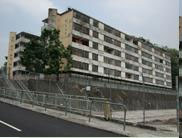 |
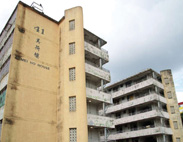 |
| Mei Ho House |
Media Relations
To gear community support, it is important to keep the HA's operations and housing policies transparent to the public. We always maintain close dialogue with the media to enable public understanding of our new developments and initiatives. In 2007/08, we issued over 68 press releases and arranged some 50 press briefings and interviews through our News Unit and handled around 943 enquiries and 991 public complaints referred by the media.
![]()
Engagement of Tenants and Business Partners
Joint Hand with our Tenants
To provide a clean living environment in Public Rental Housing (PRH) estates, we launched an Incentive Award Scheme on Estate Cleanliness in 2007. In addition to receiving a certificate of appreciation, the winning estates will receive extra funding to improve estate cleanliness.
Our cleaning initiatives have always received positive feedback from the community. One of these, "Operation Tai Ping Tei", is organised quarterly with our tenants. In 2007/08, we conducted 409 cleaning activities supported by 8 953 residents and volunteers.
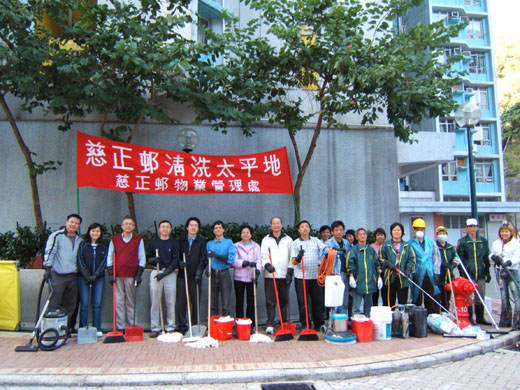 |
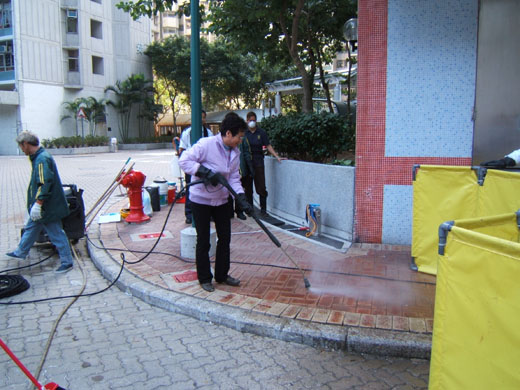 |
| Operation Tai Ping Tei |
Better Living in Estates
To foster sustainable culture in our estates, we always work with different green groups and non-government organisations to conduct a diversity of green initiatives and activities for our tenants. One successful example is our "Green Delight in Estates" programme, a collaboration with the Conservancy Association, Green Power and Friends of the Earth (HK). Under the programme, the green groups provide different educational activities regarding conservation, recycling and waste management for 30 selected estates each year (See Case Study). Another example is our Estate Green Fun Days held in 15 estates to drive the environmental message home.
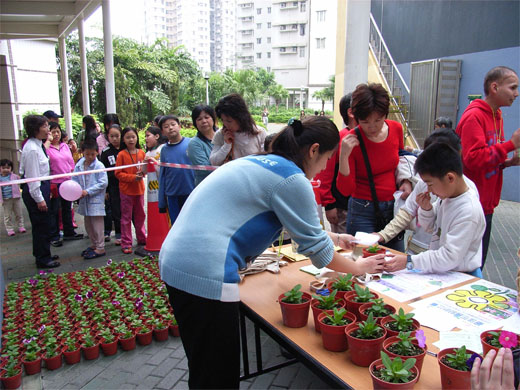 |
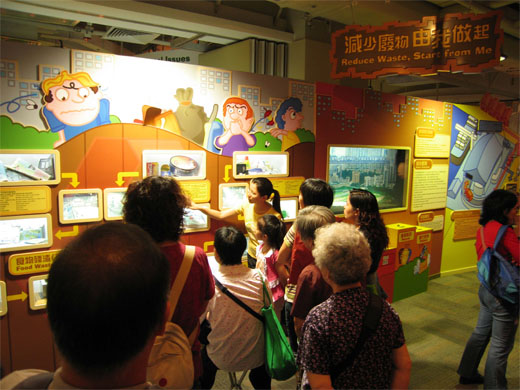 |
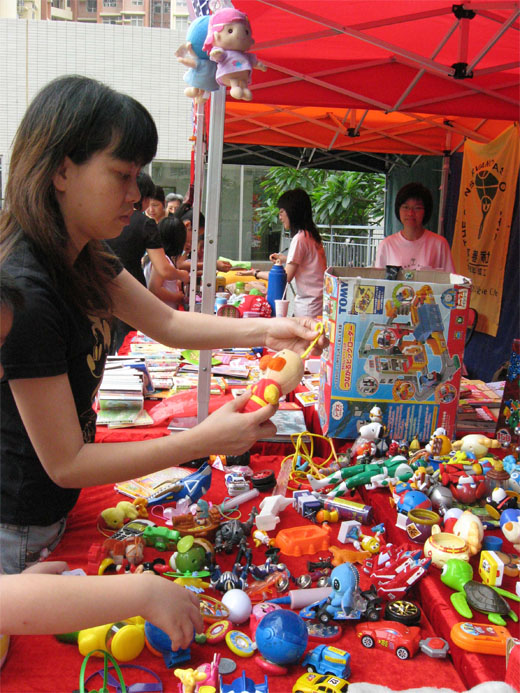 |
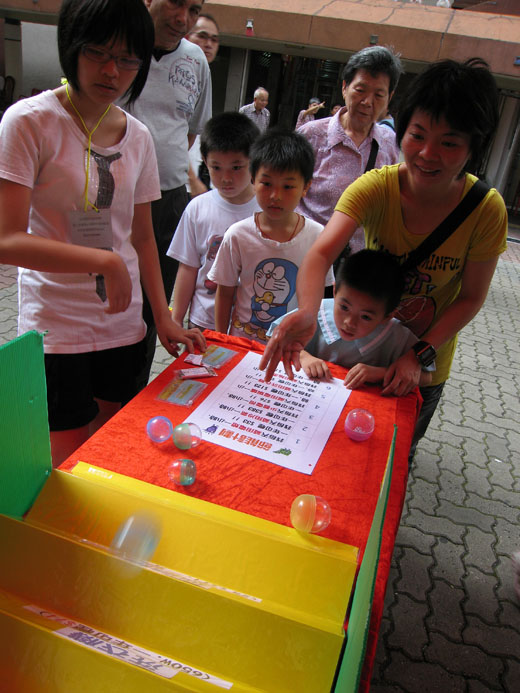 |
| Green Delight in Estates |
We also worked with the Rotary Club of Hong Kong Northeast District to launch the "Preserve Planet Earth" programme in six PRH estates. The programme invites tenants to exchange an incandescent bulb for a free energy saving bulb donated by the Club.
Aside of our own initiatives, we supported activities organised by green groups and the government. For instance, we participated in the Green Carnival organised by the Green Council and the Electrical and Mechanical Services Department's Safety Carnival to learn how to use electricity safely.

EMSD's Safety Carnival 2007

Green Carnival
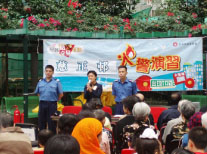 |
| Fire Drill at Tsz Ching Estate |
Fire Safety in Estates
Human life is one of our prime concerns in our operations; fire is one of the potential dangers and poses the greatest risk to our tenants. We encourage the Estate Management Advisory Committee (EMACs) to promote fire safety awareness among tenants through a special incentive scheme. In addition to regular fire drills, fire safety messages are effectively conveyed to tenants though various publicity programmes such as Fire Safety Quizzes and the Estate Fire Safety Fun-filled Shows organised jointly with a radio station. Survey results showed that our tenants have high safety awareness and over 80% are satisfied or very satisfied with the overall fire safety environment in our estates.
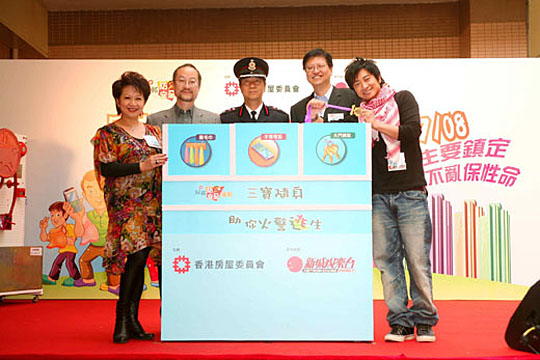
Launching Ceremony of the Estate Fire Safety Campaign 07/08
Working with Business Partners
In our new property services contracts starting June 2007, property services agents (PSA) are required to attend a partnering workshop with representatives from the Estate Management Advisory Committees (EMACs), tenant, community and frontline HA staff. The workshops enhance the mutual understanding and trust between the participating parties and also foster a culture of partnership and commitment within the community.
We also encourage PSA staff to enhance their capability through different training opportunities. We work with the Hong Kong Polytechnic University to provide a customised "Certificate in Public Housing Agency Management Course" and offer sponsorship for PSA staff to attend the training. About 100 staff completed the course last year.
To enhance safety awareness among our cleaning staff and contractors, we organised a joint promotional event with the Occupational Safety and Health Council in March 2007 and site safety seminars in July and October 2007. We also arranged seminars on labour legislation and Prevention of Bribery Ordinance for cleansing and security operatives.
In March 2008, we invited about 700 EMAC members to attend a seminar regarding the latest housing policies and management techniques in cultivating a culture of integrity and harmony in the community.
We run partnering workshops with our subcontractors as part of all our building and piling contracts. After seven years experience, a better understanding of each other's problems has led to prompt solutions, smoother progress, less paperwork, and improved quality of work. Everyone has become more proactive in working towards common project objectives.
We also assisted the Hong Kong Policy Force in developing its own training administration systems based on the HA e-Learning Portal (HAELP) and shared our HAELP with the Macau SARG.
Feedback from Stakeholders
To continuously enhance our services, we actively seek stakeholders' feedback to identify areas for improvement. One of the effective mechanisms is our annual Public Housing Recurrent Survey (PHRS). The PHRS has been conducted since 1992, with the main objectives of collecting up-to-date information on the socio-economic profiles of the residents living in public housing and tapping their views on a host of housing-related matters for facilitating policy reviews and formulation.
The main topics covered in the PHRS 2008 include:
- socio-economic profiles of PRH households;
- satisfaction levels and opinions on various estate management and maintenance services;
- views on environmental protection measures;
- households' shopping behaviours;
- utilisation of car parking facilities; and
- tenants' future housing plans.
Results of the PRHS 2008 indicated that tenants' satisfaction towards our maintenance-related services continued to improve over the past few years and reached its highest level in 2008. Over 70% of the respondents were satisfied with the cleanliness and hygienic conditions of common area in public housing estates. Some 75% of PRH tenants among those who knew the Marking Scheme for Estate Management Enforcement considered that the Scheme could help improve the cleanliness and hygienic conditions of their estates.
On the effectiveness and attractiveness of a range of enhanced housing schemes to promote harmonious families implemented since October 2007, a large proportion of PRH tenants held positive views and considered that such measures are effective to encourage young people to live with and take care of their elderly parents.
![]()
In June/July 2007, the Housing Authority (HA) conducted a large scale voluntary staff opinion survey with a response rate of 69 per cent. The survey aimed to collect staff views on various issues and promote a clearer understanding of the HA's policies among staff. The survey indicated that our staff were most satisfied with the supervision, pay and teamwork in the HA. Taking staff opinion into consideration, we introduced both long- and short-term measures to align staff aspirations with the HA's goals and objectives, especially on work efficiency, people management, organisation culture, and communication to enhance staff engagement.
In mapping out our future manpower strategy, a detailed review is being conducted between September 2007 and the end of 2008. We are currently consolidating views and feedback from staff and other stakeholders regarding the implementation of the existing staffing policies.
![]()